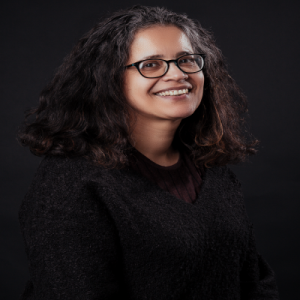 Tell us a bit about your career story so far.
Tell us a bit about your career story so far.
I started working in museums and galleries which I did for about five years.
It was actually the frustration of racism that made me decide to become an academic because I thought, “When I’m standing in front of a group of students in the classroom, no one can tell me what I should and shouldn’t say!”, and that worked for me for a bit. But of course you then realise how constraints can happen in a whole lot of other ways and that some organisations are not as enabling as others when it comes to certain groups of staff.
I came to Sheffield Hallam in 2015 as a senior lecturer, and I got my readership in 2016, followed by my professorship in 2020.
What does it mean personally to you to be a professor at Sheffield Hallam? What do you value about it?
It’s funny, I really didn’t think it was going to mean much to me! But it has made me feel like what I’ve done has been valued and recognised. I wasn’t expecting to feel like that.
And it also gave me more confidence. I sometimes used to say to people, “I’m not a ‘proper’ academic”, despite the fact I had my PhD and masses of experience in teaching. I mean, even after I’d published two monographs I still felt like I wasn’t a proper academic. But there were other people who were professors who told me they thought I was at that level, which helped me decide to apply. Prior to that I was never very strategic about what I did.
If you could go back in time and give yourself some career advice, what would it be?
- Believe in yourself.
- Be strategic about what you take on, when you have a choice. You can’t do everything and there are some things that will help you progress more than others. Make sure you have balance and carve out some space for research, although this is not only up to the individual but involves an institutional commitment as well.
Tell us about your work as a professor?
Since receiving my professorship, I haven’t done any undergraduate teaching because I won a grant from the Arts and Humanities Research Council to research into nurses and care workers’ experiences of racism called Nursing Narratives: Racism and the Pandemic. This is a project that is close to my heart. We want to reflect on the experiences of black and minority ethnic nurses during the pandemic in relation to the racism which we know is quite endemic within the NHS. We want to reflect on how we can help change the patterns of practice. We are collaborating with a documentary film-making collective to make a film and will write some research articles too.
Along with other professors and associate professors/readers I’ve been involved in the direction of the Culture and Creativity Research Institute as well as helping to reconfigure the Communication and Computing Research Centre (CCRC) into the new Centre for Culture, Media and Society (CCMS). It’s great to be involved in that kind of thing because in my research I’m naturally inter-disciplinary and this gives me an opportunity to work with people from different parts of the University.
Over the last three years I was involved in a project called Creative Interruptions, researching into Palestinian cinema and the obstacles and problems that Palestinian film-makers face while creating their work. I’ve been working on a short book recently called Struggling to be Seen: The travails of Palestinian Cinema that’s being published in December 2020 and I’m really proud that has come to fruition.